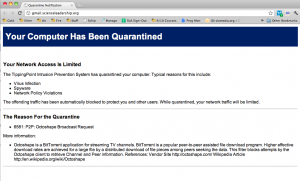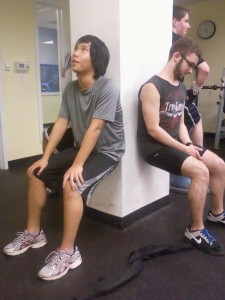Video made by Isabela Supovitz-Aznar
SLAMedia is a publication of the news for the Science Leadership Academy community. Writers come from the student body in 10th, 11th, and 12th grades. We work in unison to create a functioning paper with biweekly postings on a variety of events.
By Jenn Wright
Staff Writer
On Tuesday, January 31st, the newly-appointed leader of the School Reform Commission (SRC), Pedro Ramos, visited SLA for a tour and conversation.
His visit lasted two hours. For the first hour, he toured the school and observed classrooms with Principal Lehmann, then sat down with two SLA parents, Senior Tariq Smith, Junior Morgan Marant, Freshman Nikki Adeli, and several teachers.
“During the tour he seemed pretty surprised at the amount of kids in the hallway during projects,” said Marant. “He also asked a lot of questions.”
The visit was facilitated by a parent to give Ramos a chance to see the school. With no specific agenda, the discussion focused on how SLA does things and a wider scope about current education in general.
During the discussion, the parents spoke to the the reasons they appreciate SLA, while Lehmann spoke to the “ethic of care” that is established within the school. The adults in the room did the majority of speaking.
Ramos’ visit reflects the increased positive attention on SLA from the District. Other events include the December 6th evening meeting with now-former Superintendent Leroy Nunery and an all-day visit with a deputy superintendent.
The recent political unrest and mounting debt in the District has caused widespread changes and prompted reexamination of schools–and the hope that SLA could provide an example of what the District could do in the future.
Asking other schools to adopt some of SLA’s practices–or any major transformation–is not simple, however.
“Most District schools,” Mr. Lehmann said, “have never been given the time to develop a model.”
Ramos was in a hurry towards the end of his visit, leaving the discussion open. The dialogue is expected to continue as the District continues to reform.

By Jenn Wright
Staff Writer
Everybody who has been quarantined is frustrated about the situation.
“The way it impacted the classroom,” Ms. Laufenberg said, “was that this is the main machine I use to run my classes and for 5 days school days I was shut off from presenting information to kids and effectively doing my job.”
English Teacher Larissa Pahomov’s computer was also booted from the network, due to another widget called Octoshape, which she guesses a website installed on her laptop without her knowing it.
The first time her laptop was quarantined, Ms. Hull was able to get her machine back online the same day; but when she restarted her computer a week later, she was re-quarantined.
Ms. Hull believes it it a piece of malware that kept reinstalling itself after attempts to trash and remove it. Uncertainty surrounds as to how Ms. Pahomov eventually regained access to the network from School District of Philadelphia IT personnel because this piece of malware did not successfully get uninstalled by Ms. Hull.
She’s living with a loaner computer until the situation is resolved.
Art and Technology Coordinator Marcie Hull said of the situation,”What happens is people aren’t educated enough, they don’t know about it and these things happen by surprise because the way that information is traded they don’t realize what’s copy written and what isn’t.”
Others downloading freeware, or free applications from the net, have gotten banned unknowingly. Most small companies attempting to distribute their software in a legal fashion use a form of BitTorrent to get it to as many people as possible.
For students though, the procedure after getting pulled from the network for using a BitTorrent client contains a few annoying steps, particularly for a student from SLA requires internet access at most times of the day. A letter gets sent home for a parent to sign informing them that the computer cannot have access to SLA’s wifi connections or through ethernet.
Juniors Zach Castro and Matthew Ginnetti were among the students in Ms. Laufenberg’s U.S. History class who were quarantined.
Castro said, “It stops me from getting anything done, I can’t do any research.”
“If I didn’t have an iPad I wouldn’t be able to do any of my work,” Ginnetti added.
The student must wait 5 days after turning in the paper to regain access. A few students even have been quarantined for weeks at a time, though SLA sent the correct information in promptly.
The detection system itself is an application put on the network at SDP that automatically detects and boots machine’s using any type of peer-to-peer sharing.
Frustration within SLA has been growing, wanting to know which applications and sites will activate the quarantine. The newness of the program to the District contributes to this lack of information.
As Ms. Hull explained, keeping the network open and fast moving is what concerns the IT people at SDP. For example, blocking Youtube because of the bandwidth of the videos is a much larger issue to them than blocking it because it is distracting to academics.
In the meantime, members of the SLA community with quarantined laptops are hoping to be back on the web soon.

By Jenn Wright
Ms. Martin added: “and it’s a GOOD TIME!”
Beside the required P.E. class, Ms. Martin hosts a staff-friendly after-school workout Mondays and Wednesdays at 4pm.
It all started when Principal Lehmann wanted to get more in shape. Martin trained the teachers during their free bands while the rest of SLA worked diligently or was at lunch.
This year, the workouts moved to after school.
The Martin brand of workout is not unlike others in its intensity and difficulty, but she puts a special touch on the routine.
As Geometry teacher Ms. Thompson put it, “She tortures with a kind heart.”
When asked why she hosts the workouts, Martin responded, “because I am the sadist and they are the masochists.” She then laughed.
Training the SLA sports teams like Ultimate Frisbee, the after school sessions have gotten quite popular. Students get a kick out of working out side by side with their teachers.
As Ferry said, “it feels like we are all on the same level.”
The best part, however, has to be the music.
Ms. Thompson said, “I like that she does certain things specifically tuned to some songs. It’s sort of like a dance party, but a workout.”
Several attendees requested the music be promptly put back on when the songs stopped. One favorite is “Watch My Feet” by Dude ‘n Nem used for its mix of slow and fast tempo.
Combining music and creative workouts — like Ms. Martin’s use of a deck of cards with each card being a different exercise — keeps her followers coming back each week.

By Jennifer Wright
Staff Writer
This year, many students treated November 8th as a day to sleep in. For the students in US History Teacher’s Diana Laufenberg’s classes, however, it was much more. Each junior in her classes visited their local polling place and interviewed voters to gain insight about the knowledge and experience of the voter.
The results of the election are up and that of course is the main event but some other interesting things also took place on November 8th. Junior Sam Lovett-Perkins said, “I actually ran into a council woman [Cindy Bass] who was just saying hi to voters at the polls.”
In previous years, the assignment has gotten several students into controversial situations. In the Presidential election of 2008 students in Laufenberg’s class were hassled for attempting to take photos and interviews at the polls in their area.
“Some polling places were really not keen with kids having recording devices or people not valid voters being anywhere near the polling places because it was so chaotic,” Laufenberg said.
Laufenberg gives her contact information to everyone in the class so they can contact her with any questions or issues. She related the story about a student in her class who participated in the 2008 election.“He calls me in the morning and is like ‘Uh, so I was at a polling place and they asked me to leave’. …They basically told him he didn’t have the right to video or record.”
This got the class and Laufenberg wondering what to do. She called in to a representative at City Hall as well as searched through the city statues for some specific language stating this. Turns out, there was nothing making this type of video recording illegal. “We were right. Sometimes it doesn’t matter. I told all the kids if you get hassled at all, just walk way.”
Many of the interviews from this year, videos and recordings, live on SLA’s public webpage for public consumption. Laufenberg is working on putting links to each on a map so one could click on the polling places around Philly and see the interviews. She also got in contact with teachers on Twitter around the country and encouraged them to do the same project. A classroom in New York did the same project as the SLA juniors. She hopes to expand this in the future.
As Junior Sophia Henniger put it, “Hearing it from an actual person was a good experience because it helped me remember that people should form their own opinions about elections and voting.”
This year the feeling toward the project was positive from people at the polls. As opposed to other years, the volunteers and the voters reacted well to the questions. “We got many compliments on how interesting the project was,” said Perkins
This time next year will be the next Presidential election and some of the students doing this project this year will be able to vote. The hope is that they learned something this year to put into action for November 2012.